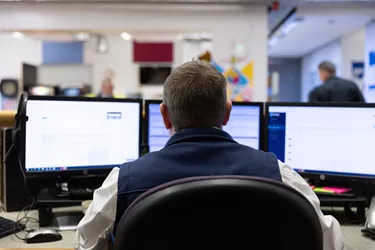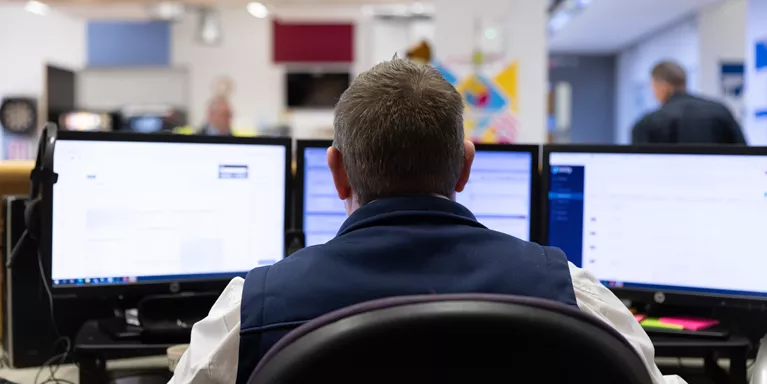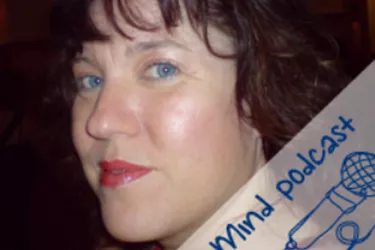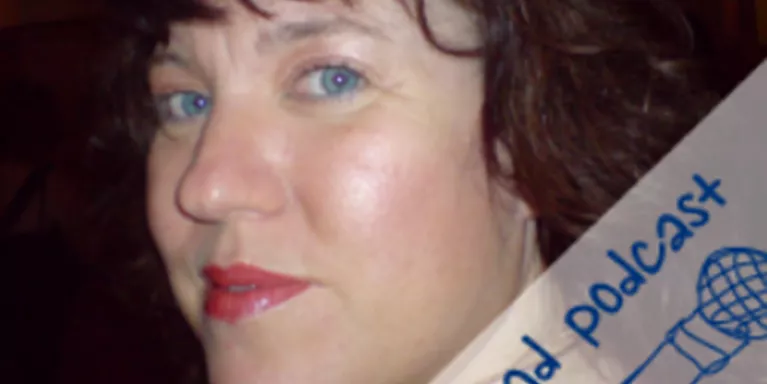Mind podcast - Living with bipolar
Siobhan talks to Heart FM's Matt Wilkinson about living with rapid cycling bipolar disorder.
For more info on some of the issues covered in this podcast, click below:
Listen to more Mind podcasts on ourAudioboom channel or iTunes channel.
Matt: Hello and welcome to the Mindcast brought to you in association with the UK’s leading mental health charity Mind.
My name is Matt Wilkinson and with me is Siobhan O’Neil, who is from London, and has experience of bipolar disorder. Siobhan, let me I start by asking you how would you best describe what bipolar is?
Siobhan: All or nothing. When you’re well, when you’re really well, anything is possible. You feel like you’re a genius, actually. You feel that you’re the only person in the world who can see it the right way.
Undiagnosed, I spent so much money, oh my god, you’ve no idea how much money, and got myself very seriously into debt. I ordered so many things from catalogues and would do gambling, quite a lot of gambling actually. I would do things that were about glamour and wanted instant gratification in all kinds of ways.
The lows, the nothing, is just about having nothing left in you. You’re even beyond tears. You’re even beyond thought. My actual diagnosis is rapid cycling bipolar disorder and so I tend to move up and down every twelve weeks or so.
The tricky part, when you’re in the low part and you’re very depressed and so lacking in motivation, is the moment when you begin to get well and you experience a kind of mixed state. Because if you’re active, that’s the moment where it’s quite tricky and that’s the moment when you might actually consider taking your own life. That’s the bit you have to manage the most carefully. At either end of the spectrum, it is all or nothing.
Matt: You touched on the high, or manic, phase just now. I think less is known about that compared to the depressive side of the condition. So how would you explain it?
Siobhan: As you are moving up through it, you feel fantastic. You think you can move mountains, you can run marathons, that you have the best ideas in the world.
But of course what happens is your body starts to get very tired. And also people are getting tired of you for going on and on. Your speech will be much more rapid, you won’t sleep and you’re probably sweating quite a lot as well.
Your body is just kind of on alert all the time. So of course, as it goes up, it moves through that fantastic moment, where you become very uncomfortable and irritable and you can’t understand why people can’t see things the way you see them.
You’re moved to tears by watching TV, and thinking, god, I know how to get rid of world famine. You want to be able to communicate some great ideas but you can’t do it. Your skin, I’ve often described it as feeling as if I’m wearing my skin inside-out, that all the nerves are on the outside, and it’s incredibly uncomfortable. That’s the moment when you know you’re unwell.
Matt: When did you first become aware of your bipolar?
Siobhan: My mother would always describe me as quite a sensitive child. I was quite quiet, quite bookish. When my dad left, when I was about eleven, I definitely went into a depression then. It probably wouldn’t have been recognised, but I do have very strong memories of not actually speaking to anybody at all, which was quite difficult going to school and not actually answering the teacher or anything. I just physically felt like I couldn’t even speak. And kind of fast forward to twenty or so years later, that was one of the features of my depression, that I would just simply be completely unable to speak.
Matt: And did you seek any help when you were younger? What were the circumstances that led to when you sought help for the first time?
Siobhan: I would say that I’d had a lot of peaks and troughs. Because it’s during the teenage years, those sorts of peaks and troughs, the ups and downs, that kind of thing seems like hormones but it was much more marked in me.
I think that I would have been variously described as volcanic or just completely quiet. When I was nineteen, after a particularly difficult broken relationship, I attempted to take my own life, and it was then that my own GP became more involved with trying to sort out some kind of more permanent support.
But it didn’t last for very long because that was the point when I went to university. And I accessed some level of psychiatric services there. The counselling services at the poly were really helpful, but it really didn’t touch the sides. I was still behaving in the same way, still staying up all night, and all my course work was late.
And then of course leaving and travelling for a while meant that I just didn’t have any access to support, and by the time I came back, I was very unwell. I started a job for a telephone company, working on a switchboard helpline, and again it was shift work, so that really did play havoc with my body clock. And again, I always seemed to opt, when I was really full of energy, to go for the night shifts. I then decided that I could also do a second job, so I was often working, at times in excess of a hundred hours a week, just pushing and pushing and pushing and then being unable to work at all.
Matt: At what point did you go, “I can’t keep doing this, something’s wrong, I need to go and seek help”?
Siobhan: I did have a very very serious breakdown, when I was thirty, which necessitated me taking almost a year off work. And I had been working incredibly hard before that happened. I also had a two-year old son and so it was a very very difficult time.
I was fully supported by psychiatric services in my local area but it only ever appeared, because what I was presenting with was very severe depression and exhaustion, it just seemed as if I had a depressive illness.
So it was really quite late on for me, and it was that moment, that kind of white light, where I just thought, “I can’t carry on like this”. I was 38 when I just went to the bus stop one morning and thought, “I can’t do this any more. I’m living in the highs, in the moments when I can do lots of things and be really creative and do lots of good work but it’s the low points which are really really hard for me”.
I have to say also that the high points would become very uncomfortable and then I would crash and become very exhausted. And so again, through a referral through my GP in London, I then met another consultant and started the same routine again. But this time I said, “I think there’s more to this than just depression”. Because I felt so very uncomfortable with who I was and I felt a crushing sense of failure that I wasn’t managing and particularly because I had a child as well. I didn’t want to live this life that was so erratic. I didn’t want to feel that I was always on the edge of something terrible happening.
Matt: You say you had a number of breakdowns. What is a breakdown?
Siobhan: For me, it feels as if I’ve just come to a complete stop. It’s like I’ve reached the end of whatever journey that I’ve been doing. That I’ve been full of energy, full of ideas, probably getting quite angry with people because they didn’t seem to understand their connection to the universe, or to the ideas that I had, the things that we could do, the things we could achieve. And then it would just come to a complete stop and then it would just be a sheer drop. In the run up to that there had been instances of alcohol abuse, inappropriate relationships, anything to stop the feeling of pain actually. But when the moment comes, for me, it’s a bit like a cartoon where someone runs off the edge of a cliff and they are just held for a second before they drop.
Matt: And how long does a breakdown episode go on for? Is it a couple of days, is it a month, that you’re feeling like that?
Siobhan: It depends on, probably, how long you haven’t slept before the crash occurs. Sleep is an extremely important part of managing bipolar disorder. If your sleep pattern starts to slip, if you’re not sleeping properly, or if you’re not sleeping at all, then it’s always something you should seek help with.
It’s just about a measure of balance and ensuring your body is rested, because if your brain is going too quickly, it will wear your body out very quickly also. It’s about the body and the mind recovering together really. Of the major breakdowns I’ve had, one took about seven months to get well, properly well, and another took a year.
Matt: And when you said you went to the bus-stop that day, was that just after a breakdown?
Siobhan: No, I’d had several weeks of…, no, I’d had several months of not being able to function properly. I felt really really lonely. I’d not really had anybody to talk to. I would work all day and be all sparkling and, or in my head I thought I was being sparkling and enthusiastic and all those things, and then I would come home at the end of the day to my social housing flat, as a single parent, living in a huge council estate in London, and it felt like I was split.
There were two parts of me and I couldn’t bring the two together. I would try and have my son looked after by anybody who would have him and just go out all night, and would write and write and write. All those behaviours had kind of contributed to me becoming just rapidly more and more exhausted. Redundancies were happening in the company I was working at and I think that that probably triggered my stress levels into overload, and I became incredibly frightened all the time, very paranoid.
Somehow I managed to keep taking care of my son but I have huge regrets about that. I probably didn’t look after him as well as I could, not that I was ever under any scrutiny, but I wasn’t the best parent that I could have been, because I was so much thinking about me all the time.

Matt: What changed then? I mean it sounds as if you were going through a turbulent time, both at your work, and with your experiences and going out and your writing lots. Are these manic phases would you say?
Siobhan: Yes definitely.
Matt: OK. So at what point did things start to settle down for you? Is that when you were diagnosed?
Siobhan: Yes. Actually, it’s a really interesting area because some people don’t respond very well to being given a diagnosis. It’s a label after all. But actually, for me, there was a period of grieving I have to say, but kind of it … it made sense. It just made sense. And knowing that there was a pattern. Because when you live inside yourself, you don’t see that you do things habitually, regularly.
When you’re living with a mental health condition that’s not diagnosed, what it does is it just creates obstructions in your life. And somehow for me, once that period of mourning was over, it became an opportunity for me to develop myself, to understand myself better. And I think that that’s what I have been doing for the last seven years.
And I think, knowing myself, and knowing the triggers that would set me off my illness, I’ve actually been able to achieve a better sense of balance. I’ve not yet been able to find employment full-time and actually that’s something that is coming up for me, that I really want to do. My son is now eighteen. He’s going to university in a couple of weeks, and I think that the time for me is back to build on the next bit, which is, I’m strong and robust about my condition and how I manage it. Now I need to test it against employment. Which is always difficult for people with a long-term mental health condition because there are going to be times when I can’t offer all of myself, so how do I offer myself to an employer on a full-time basis?
Matt: When you got your diagnosis, how did your family and friends react?
Siobhan: Very very mixed reactions. Some of the people who are really close to me said, “Yes. That makes perfect sense”. There were some people who just absolutely couldn’t accept it. But when I reflect on their initial responses, it was much more to do with fear.
They were responding based on kind of known stereotypes of what mental ill health looks like. Those kind of ideas about people being crazy, they would see that, and see me, and wouldn’t think the two things were the same thing.
Well, of course they’re not, because the stereotype doesn’t exist in real life. It was very painful to have people just saying, “No”, because it felt like I wasn’t being believed, that somehow I was making it up.
Those who did understand, who got it, have been enormously supportive. And of course, the people who didn’t believe have long since disappeared out of my life. Because, in the end, it’s not actually about the diagnosis. It’s about the illness and being able to manage it. And also about people loving you and you loving them. We deal with different kinds of illness every day and people being diagnosed with diabetes or some other long-term health condition.
We still love the person. It’s about behaviour, sometimes it’s intolerable, but you still love the person essentially. And, as I say, the people who disbelieved or scoffed have long since disappeared out of my life.
Matt: When you’re suffering, what is it that you want from family and friends?
Siobhan: It depends on where you are in the cycle. When I’m very depressed, I tend to just take to bed and sleep quite a lot. I don’t have any motivation. I tend to not speak to people. My friends will say ... they know that I’m in a low phase, because I just go off the radar for a little while. And they leave me to do that, because they know that it’s necessary, that I just need to rest really.
But they wouldn’t let it go on for very long. In high phase, prior to diagnosis, what I would do is I would go out every night of the week, but I’d go out with someone else because I’d just wear one person out. Now if I’m very sociable, my friends will identify that that’s something that’s going on for me, and they’ll say, “I think you might be heading into a high phase, how are you feeling?” So they’re providing me with insight at a time when insight kind of disappears for me, for that time. And it does also help with being able to manage it, so it doesn’t become too high, too uncomfortable.
Matt: So your friends are very important to you in stages like that?
Siobhan: Yes.
Matt: Have you taken any medication?
Siobhan: Yes. I’m on two types of medication. One is called sodium valproate, which is an alternative to lithium. I was really really blessed actually, because sodium valproate was the first one I was put on and it suits me.
There tends to be a split between those who favour lithium in terms of their own body chemistry and those who prefer to take sodium valproate. And besides that, for the high part of my diagnosis, I also take an antidepressant as well. Prior to diagnosis, I’ve taken so many different antidepressants and so many of them didn’t work. But when I went on this particular regime, the dose was quite high. But because then I introduced life-style changes, such as exercise and meditation and yoga and massage and gardening, and lots of kind of life-enhancing things, so I’ve actually been able to reduce the dosage to a bare minimum. Which means I don’t have the same fuzzy-headedness, or feeling spaced out, or feeling I can’t connect with people.
That’s what’s worked for me. It doesn’t work for everybody. But it is important to try and find things that help you to feel that you can manage your life.
Matt: And what other forms of therapies or treatments have you used?
Siobhan: I’ve had CBT.
Matt: That’s cognitive behavioural therapy?
Siobhan: Yes. That’s right. It’s something that needs to be given to you at a time when you’re ready to do it and I think that’s true of all therapies really.
There’s no point in just thinking you’ll go through the hoops of whatever is available. You do need to be ready to do the work that cognitive behavioural therapy requires of you. I started, and then I had to stop. But when I returned to it, I was so much more motivated and ready to use it in its proper way. I’m currently having a much more person-centred therapy which isn’t available on the NHS.
It allows me to examine my own past, because, whilst I’ve been unwell and undiagnosed, clearly it’s created my own history. And there are many, many things in my past which I regret, and it’s important to come to terms with that regret, and to work on it and build from it, in my own personality, how I want to be in the future. I gain the most learning out of it. It’s a very long therapy. It goes on as long as you want it. There are other kinds of therapy available but this is the one that suits me.
Matt: And you mentioned exercise. Is that something you’ve always done, or is that a recent discovery?
Siobhan: Well I suppose, actually, it probably ties in with when I used to go out dancing all night and felt very good about myself.
That probably figures in it somewhere. But I always loved dance and I always loved exercise. And when things had stabilised after diagnosis and starting to take medication, part of the thing that prompted me was that my weight really ballooned. And I didn’t feel like me at all. I felt really really low about it. But I was aware that actually the medication was working in terms of keeping me fairly even, so I decided to take up exercise again.
And I started slowly, just started walking, and then went to the local gym and started doing exercise classes. I was all over the place to start with. It had been a long time, a long time, since I had done any exercise. But the music, the human contact, the laughter, pushing yourself that little harder each time, it really worked for me. And since then, I’ve done the Great South Run and I’ve done the Great North Run as well. And, one day, I will get to do a marathon. [laughter] That just seems a really really long run. [laughter]
Matt: I think we all say that. The present day now, how does it affect you on a day-to-day basis? Is it always there?
Siobhan: Yes, it’s always there. You wake up in the morning and you wonder how is it going to be today? The last few weeks for me have been a bit on the tricky side. I was very low, and it was actually my son, who said to me, “Is this what it’s going to be like, when I go away to university? Are you going to spend every day in bed?”.
And I suddenly thought, you know what, I’ve worked this hard on me, I don’t want him to go off to university thinking that he needs to worry about me. He doesn’t need to, I’ve got this support network, and I want him to have the benefits of a really wonderful time at university.
Mine was quite blighted by my illness, because obviously I was undiagnosed. I want him to have fun and I don’t want him to worry about me. And so my mood has picked up in the last few weeks because it’s important for me to make sure that I keep going, so I’ve used distraction around doing lots of little projects and stuff.
I’ve signed up to do another writing course, yes I am still writing [laughter], and just little bits and pieces to keep me going. And once he’s organised and at university, then I’m going to start looking at the prospect of actually getting back into full-time employment.
Matt: And, in terms of applying for a job, is it one of those things you feel you need to tell people, or is it one of those things you need to wait until you’re asked?
Siobhan: I have chosen to tell. Not that I’m not afraid of the circumstances, but I just think, “If you are going to discriminate against me because of my mental health issue, let’s talk about it now, let’s do it now.” Because the chances are that if you do, you’re not going to interview me. And if you are discriminating against me, then that wouldn’t be right. And the only way that I feel that I can get through that is to be honest about who I am.
My experience of bipolar disorder isn’t as severe as some people’s. I think the phrase that they use, in mental health care circles, is that I’m quite high-functioning.
That doesn’t mean that I don’t get unwell. It’s just that, on the whole, I have a lot of insight into how my mind works and I take care of myself. That’s the reason why I’m high-functioning. But, of course, when you say to somebody, “I have bipolar disorder”, they won’t see the subtleties of what that might mean. And clearly where the difficulty would be, particularly with bipolar disorder, is periodically you might become very unwell.
You can relapse, of course. But, in some ways, it’s also just about helping people to become aware. For me, it helps reduce stigma. The more we talk about this, the more we are open about what that experience is and how it might affect how you might do things, the more people get used to it, to be really honest with you, the more they see it as part of the range of human experience, rather than something that is separate, shut-away and not talked about.
Matt: And what would be your best advice for someone who has just been diagnosed with a mental health issue?
Siobhan: Take some time. Take some time to work through what that might mean for you. Talk to people. Talk to people that you really trust. And be kind to yourself. Because diagnosis is a big thing and I think that the more that you get to know yourself better, the more you get to understand what the condition means, in terms of the symptoms, but also what it means for you.
It will mean that you might have to grieve your old life and that you’ll have to leave it in some form. So the partying and the spending and all that kind of thing will almost certainly need to disappear from your life. Because what’s really important is about managing it for yourself. When you’re first diagnosed, you will rely on a lot of other people. But there has to come a point where you have to take responsibility for yourself. That’s some way down the line. But you need to manage your medication. You need to take care of you. You need to explain the change in the situation to friends and to loved ones. You need to manage the things that trigger you. You need to find out what they are in the first place, but then how you are going to minimise them, in a way that allows you to live a more balanced life and to prevent relapse in the future.
Matt: And how do you feel about the future for yourself?
Siobhan: I take it one day at a time. Sometimes I can take it a week at a time, but today I’m taking it a day at a time. When things aren’t great, if it has to be, I’ll take it an hour at a time. Because I’m aware that I need to pace myself. I’m aware that I need to take care of myself. And it’s not just about me, it’s about my context, not only in terms of my family, but in terms of society. So taking care of me is the most important thing. The future for me, well the future is what it will be. But it’s down to me to make my future. I’m responsible for it. And so as long as I can take responsibility for who I am and what I want to do and where I want to be, then I’ll be OK.
Matt: Siobhan, thank you very much.

Information and support
When you’re living with a mental health problem, or supporting someone who is, having access to the right information - about a condition, treatment options, or practical issues - is vital. Visit our information pages to find out more.
Share your story with others
Blogs and stories can show that people with mental health problems are cared about, understood and listened to. We can use it to challenge the status quo and change attitudes.















